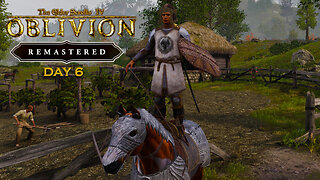Premium Only Content

History Canaan, Jerusalem, Crusaders. Ottoman, Palestine, Israel Timeline Documentary
Brief Overview of the History of Israel The land which is today the country of Israel has been sacred to the Jewish people for thousands of years. Today the land is also sacred to other religions such as Christianity. In 2000 BC, the Jewish Patriarch Abraham was promised the land of Israel by God. This is a timeline of modern Israeli history, comprising important legal and territorial changes and political events in Israel and its predecessor states, along with important events which influenced the Zionist movement. To read about the background to these events, see History of Israel. Here is a timeline beginning around 1948, including the latest violence in the Gaza Strip: ... The Ottoman Empire had controlled that part of the Middle East from the early 16th century until control of most of the region was granted to the British after World War I. Both Israelis and Palestinians were struggling for self-determination and sovereignty over the territory, developing respective movements for their causes. Timeline and History Overview - Israel Timeline
BCE
1700s - Abraham settles in the land of Israel (Canaan).
1500 - Joseph is sold into slavery. His family join him in Egypt.
1400s - The Hebrews are enslaved by the Egyptians.
Baby Moses Being Rescued
1300 - Moses leads the Hebrews out of Egypt.
1200s - The Hebrews arrive in Israel.
1020 - Saul is crowned the first King of Israel.
1000 - David becomes King of Israel.
922 - Israel is split into two nations: Israel in the north and Judah in the south.
722 - The Assyrians conquer the Northern Kingdom.
586 - Babylon, ruled by Nebuchadnezzar II, conquers Judah and destroys the Temple and takes many Israelites captive.
538 - Cyrus the Great, King of Persia, conquers Babylonia. He allows the Jewish people to return home.
The Tower of David
516 - The Second Temple is constructed in Jerusalem.
322 - The Greeks, led by Alexander the Great, conquer Israel along with all of Persia and Egypt.
167 - The Maccabean revolt occurs and brings independence to the Jews.
63 - Rome, led by Pompey the Great, conquers Israel.
37 - Herod the Great is made King of Israel by Rome.
CE
30 - Jesus Christ is crucified.
70 - The Romans destroy the Second Temple and much of Jerusalem.
73 - The last of the Jewish rebels are defeated at Masada.
132 - The Jewish people revolt against Roman rule. Hundreds of thousands of Jews are killed.
The Western Wall
200 - The Mishnah, the first portion of the Talmud, is written down. This is the oral traditions and law of the Jewish people.
350 - The Jerusalem version of the Talmud is completed. Another version, the Babylonian version, will be compiled around 500 CE.
614 - The Persians capture Jerusalem after the Siege of Jerusalem.
629 - The Byzantine Empire recaptures Jerusalem.
638 - Muslim forces capture Jerusalem.
691 - The Dome of the Rock is built on the Temple Mount.
1071 - The Seljuk Turks take control of Jerusalem and forbid Christians from entering the city.
1096 - Christians in Europe embark on the First Crusade.
1099 - Crusaders take control of Jerusalem.
1187 - Saladin, the Sultan of Egypt, captures Jerusalem. Jews are allowed to enter the city.
1517 - The Ottoman Empire conquers the Mamluk Sultanate and takes control of Israel. Suleiman the Magnificent rebuilds much of Jerusalem. The Ottoman Empire will rule until the 1900s.
Modern Day Israel
1914 - World War I begins.
1917 - The Ottoman Empire is defeated by the British.
1920 - The British take over Israel as part of the Palestine Mandate.
1939 - World War II begins. During the war 6 million Jewish people will be killed by Adolf Hitler and Nazi Germany in the Holocaust.
1945 - World War II comes to an end.
1948 - The independent country of Israel is declared. The first Prime Minister of Israel is David Ben-Gurion.
Golda Meir
1948 - Israel is attacked by a coalition of Arab countries including Egypt, Jordan, Iraq, Syria, and Lebanon in the first Arab-Israeli War. The Israelis win the war.
1949 - The first Knesset (Israeli assembly) is held. Israel becomes a member of the United Nations.
1956 - The Suez Crisis occurs when Egypt takes control of the Suez Canal.
1967 - The Six-Day War is fought between Israel and a group of Arab nations including Egypt, Syria, Jordan, and Iraq. Israel won the war and took control of the Gaza Strip, the West Bank, and the Golan Heights.
1969 - Golda Meir is elected Prime Minister. She is the first woman prime minister of Israel.
1973 - The Yom Kippur War takes place when Egypt and Syria attack Israel on the Jewish holy day of Yom Kippur. Israel was able to push back the Egyptian army.
1979 - Israel signs a peace treaty with Egypt at Camp David in the United States.
1980 - The Shekel becomes the official currency of Israel replacing the Israeli lira.
Begin and Sadat
1991 - The Gulf War occurs. Israel is hit by Scud missiles from Iraq.
2009 - Benjamin Netanyahu is elected prime minister.
Brief Overview of the History of Israel
The land which is today the country of Israel has been sacred to the Jewish people for thousands of years. Today the land is also sacred to other religions such as Christianity. In 2000 BC, the Jewish Patriarch Abraham was promised the land of Israel by God. Abraham's descendents became the Jewish people. The Kingdom of Israel emerged around 1000 BC and was ruled by great kings such as King David and Solomon.
Over the next 1000 plus years various empires would take control of the land. These included the Assyrian, Babylonian, Persian, Greek, Roman, and Byzantine Empires.
In the 7th century the land was taken over by the Muslims. Later, the land would change hands a few times until the Ottoman Empire took control in 1517. The Ottoman Empire ruled until the 1900s.
During the rule of the Arabs and the Ottoman Empire, the Jewish nation had dispersed throughout the world. Many millions lived in European countries. During World War II, Nazi Germany had hoped to exterminate the Jewish people through the Holocaust. Millions of Jewish people were executed and killed in concentration camps.
After the end of World War II the United Nations divided up Israel between Arab and Jewish states. The Arabs rejected this division. On May 14, 1948 the Jewish people in the area proclaimed independence, naming their country Israel. Egypt, Iraq, Syria, and Lebanon immediately attacked and the 1948 Arab-Israeli War began. After a year of fighting a ceasefire was declared and temporary borders were established.
Hostilities continued between the Arabs and the Israelis in a series of wars including the Yom Kippur War in 1973. Today the tensions and hostility still exists between the two.
https://jcpa.org/wp-content/uploads/2013/10/TimeLine.pdf
Israel's History
Why it’s so important to understand a brief overview of the historical periods of Israel.
The Holy Land is an old place, about the oldest in the world! While in the Holy Land, you’ll be seeing things as old as 6,000 years. That’s old! Different periods of history will be referred to when describing Israel’s holy sites and places. Please realize that there will likely be several key events at a particular site that have taken place there. Each event will have happened during a specific period in Israel’s history. If you can understand the different periods a little, you’ll get much more out of your experience.
Chronology of Time Used by Archaeologists and Historians
Early Bronze Age 4000–2000 BC
Middle Bronze Age 2000–1500 BC
Late Bronze Age 1500–1200 BC
Iron 1 Age 1200–1000 BC
Iron 2 Age 1000–586 BC
Canaanite Period 4000–1875 BC
4000 BC – Canaanites inhabit the land of Israel.
2500 BC – Noah and the Great Flood.
2100 BC – Tower of Babel
2095 BC – Abraham moves to the land of Canaan from Ur of the Chaldeans.
1880 BC – Jacob and his family move to Egypt to live with Joseph.
Israelite Period 1450–965 BC
1450 BC – Exodus of the Israelites from Egypt.
1406 BC – Nation of Israel enters the Promised Land.
1012 BC – King Saul unifies the 12 Hebrew tribes into the United Kingdom of Israel.
1004–965 BC – King David's reign.
First Temple Period 965–586 BC
965–925 BC – King Solomon’s reign; glory years of the Kingdom of Israel.
950 BC – Solomon builds the magnificent temple on Mount Moriah in Jerusalem (same place Abraham intended to sacrifice Isaac).
926 BC – Kingdom of Israel divides because of Solomon’s sins. Jeroboam reigns over the northern Kingdom of Israel from Samaria. Rehoboam reigns over the southern Kingdom of Israel from Jerusalem.
722 BC – Assyrians conquer and deport most of the northern Kingdom of Israel to Assyria.
586 BC – Babylonians conquer Jerusalem and Judah under Nebuchadnezzar and deport most of the southern Kingdom of Judah to Babylon.
Second Temple Period 538–444 BC
538 BC – Many Jews return from Babylon; Second Temple began to be rebuilt under the leadership of Zerubbabel.
515 BC – Completion and Dedication of the Temple
458 BC – Ezra returns to Jerusalem with a second wave of Jews and teaches all Israelites about the Bible.
444 BC – Nehemiah returns to Jerusalem to rebuild the city walls.
Hellenistic Period (Greek Rule) 333–167 BC
333 BC – Alexander the Great defeats the Persian Empire and sets out to conquer the world. After his sudden death in 323 BC, the Greek Empire is divided. During this period, the Bible is translated into Greek (the Septuagint).
Hasmonean Period (Maccabean Rule) 167–63 BC
167 BC – When the Jews were prohibited from practicing Judaism, and their temple was desecrated as part of an effort to impose Greek-oriented culture and customs on the entire population, the Jews revolted. First led by Mattathias of the priestly Hasmonean family and then by his son Judah the Maccabee, the Jews subsequently entered Jerusalem and purified the temple. This purification of the temple is remembered by the Jewish Holiday, Hanukkah (164 BC).
Roman Period (Roman Rule) 63 BC–313 AD
63 BC – Jerusalem is captured by Roman general Pompey.
37 BC–4 BC – Herod, Roman vassal king, rules the Land of Israel. He enlarges the Temple Mount and rebuilds the temple. He also builds other monumental projects, including Caesarea, Herodian, Cave of the Patriarchs, and Masada.
4 BC – Jesus is born in Bethlehem.
27–30 AD – Ministry of Jesus.
30 AD – Jesus crucified.
66 AD – Jewish revolt against the Romans.
70 AD – Destruction of Jerusalem and Second Temple.
74 AD – Fall of Masada.
132 AD – Bar Kokhba Revolt. Roman Emperor Hadrian destroys Jerusalem and builds Aelia Capitolina, a pagan city in its place. Many holy sites are preserved, but with pagan shrines on them.
Byzantine Period (Eastern Roman Empire Rule) 313–614 AD
313 – Emperor Constantine recognizes Christianity, later becoming a Christian himself.
326 – Constantine’s mother, Helena, goes to the Holy Land and builds many churches and basilicas on holy sites.
Persian Period 614–628 AD
614 – Persian conquest of the Holy Land. Many churches and monasteries destroyed.
628 – Holy Land recaptured by the Byzantines.
Muslim/Arab Period 638–1099 AD
638 – Muslim/Arab conquest of the Holy Land completed. Rule is by Caliphs from Damascus, then from Baghdad, and then Egypt.
691 – On top of the First and Second Temples in Jerusalem, the Dome of the Rock is built by Caliph Abd el-Malik.
Crusader Period 1099–1291 AD
1099 – Crusaders (Catholic armies from Rome) conquer Jerusalem and many parts of Israel.
1147 – Second Crusade arrives in the Holy Land.
1187 – Destruction of the Crusader army by Muslim leader Saladin. Collapse of Crusader Kingdom begins.
1265 – Mamelukes, led by Sultan Beybars, conquer the Holy Land.
1270 – Final Crusade arrives, and all its participants are massacred.
1291 – Last Crusader stronghold of Acco taken, ending Crusader rule.
Mamluk (Muslim) Period 1291–1517 AD
1291 – Mamluk rule begins.
1333 – Franciscan Order established in Jerusalem. Its members care for holy places and pilgrims.
By the end of the Middle Ages, the country’s urban centers were virtually in ruins, most of Jerusalem was abandoned, and the small Jewish community was poverty-stricken. The period of Mamluk decline was darkened by political and economic upheavals, plagues, locust invasions, and devastating earthquakes.
Ottoman (Muslim) Period 1517–1917 AD
1517 – Following the Ottoman conquest in 1517, the land was divided into four districts and attached administratively to the province of Damascus and ruled from Istanbul.
1520 – Suleiman the Magnificent rebuilds the city walls of Jerusalem.
1799 – Napoleon Bonaparte invades Israel but fails to capture it and is forced to leave.
1860 – The first neighborhood, Mishkenot Sha'ananim, is built outside of Jerusalem’s city walls.
1882 – First large-scale immigration to Israel, mainly from Russia.
1904 – Second large-scale immigration from Russia and Poland.
British Period 1917–1948 AD
1917 – British Foreign Minister Lord Balfour issued on November 2, 1917, the so-called Balfour Declaration, which gave official support for the “establishment in Palestine of a national home for the Jewish people” with the commitment not to be prejudiced against the rights of the non-Jewish communities.
1947 – The United Nations approved the partition of Israel into separate Jewish and Arab states on November 29, 1947.
State of Israel Period 1948 to Present
1948 – On the day when the British Mandate in Palestine expired, the State of Israel was instituted on May 14, 1948, by the Jewish National Council under the presidency of David Ben Gurion.
1948–1949 – The Arab-Israeli War; the Arabs refused to accept the newly established State of Israel. Egypt, Syria, Transjordan, Lebanon, and Iraq attack Israel, but within a year, Israel defeated its attackers.
1950 – Western Jerusalem was proclaimed the capital city of Israel on January 23, 1950.
1956 – The Suez Crisis: Israelis invade Egyptian territory in October of 1956.
1956 – After Egyptian President Gamal Abdel Nasser nationalized the company that administered the Suez Canal, a joint attack by the French and British was launched. Egypt suffered military disaster in November 2, 1956. Israel captured the Sinai Peninsula, but after international condemnation, Israel was forced to withdraw.
1967 – Six-Day War: after Egypt closed the Straits of Tiran on May 22, 1967, Israel launched an attack on Egyptian, Jordanian, Syrian, and Iraqi airports on June 5, 1967. After six days, Israel conquered Jerusalem, the Golan Heights, Sinai, and the West Bank.
1973 – Yom Kippur War: on October 6, 1973, on the Jewish holiday of Yom Kippur, Syria and Egypt launched a surprise attack against Israel. After initial success of the attackers, Israel managed to cross the Suez into Egypt and endangered Cairo. After the intervention of the USA and USSR, military operations ended on October 25, 1973.
1978 – The Camp David Accord was signed by Israeli Prime Minister Menahen Begin, and Egyptian President Anvar as Sadat in September 1978, in Camp David, USA. Israel agreed to withdraw from the occupied Sinai Peninsula.
1979 – The Israel-Egypt Peace Treaty was signed on March 26, 1979, in Washington.
https://www.holylandsite.com/israel-history-timeline
The land of Israel has been populated by the Jewish people since 2000 BC. Here's the timeline, in case you didn't realize that it is their homeland, as designated by Yahweh.
1900 BC: Abraham chosen by God as the Father of the Jewish Nation.
1900 BC: Isaac, Abraham's son, rules over Israel.
1850 BC: Jacob, son of Issac, rules over Israel.
1400 BC: Moses leads the people out of Egypt and back to Israel.
1010 BC: King David unites the 12 tribes into one nation.
970 BC: King Solomon, son of David, builds the first temple structure in Jerusalem
930 BC: Israel is divided into two kingdoms, the Kingdom of Israel and the Kingdom of Judah.
800s BC: The rise of the prophets, God's messengers.
722 BC: Kingdom of Israel is conquered by Assyrians.
605 BC: Kingdom Judah is conquered by the Babylonians.
586 BC: Solomon's Temple is destroyed by the Babylonians.
539 BC: Persians conquer the Babylonians and take control of Israel.
538 BC: The Jews return to Israel from exile.
520 BC: The Temple is rebuilt.
450 BC: Reforms made by Ezra and Nehemiah.
433 BC: Malachi is the end of the prophetic age.
432 BC: The last group of Jews return from exile.
333 BC: The Greeks conquer the Persian empire.
323 BC: The Egyptian and Syrian empire take over Israel.
167 BC: Hasmonean's recapture Israel, and the Jews are ruled independently.
70 BC: Romans conquer Israel.
20 BC: King Herod builds the "third" temple
6 BC: Jesus Christ is born in Bethlehem
70 AD: Romans destroy the temple
After that, the people were captives to the Romans, Byzantines, Arabs, and Crusaders. Through all of these events, the Jewish people continued to live in Israel. There were more or less of them, depending on the centuries, but there was never a time when the Jews didn't live in the land. They stayed, they built their communities, they raised their families, practiced their faith and they suffered at the hands of many outside rulers, but they always kept their faith. It is what sustains them, even now.
In 1948, the UN established the State of Israel, the nation of Jews. Don't buy the Palestinian lies that they are entitled to the land. It simply is not true. Yahweh will also provide a way for his chosen people to live in Israel, as He has for thousands of years. Pray for the people of Israel.
Are most Palestinian families originally from Palestine?
No. My ancestors originate from near the Iraqi / Jordanian border. While part of my family started settling in what used to be called British Mandate Palestine, other parts of my family moved east to Baghdad.
As children and young teenagers my paternal grandfather would tell me and my sister all kinds of lovely stories about his life, adventures, and businesses he used to own in Baghdad.
One recurring topic was the exodus of Iraq’s Jewish communities, which he always called a great national catastrophe and personal tragedy. Iraq’s Jewish communities were one of the main import / export trading backbones and so when these communities disappeared their excellent trading connections and business relationships disappeared with them as well, as did much of the wealth they had generated and that helped sustain much of Iraqi society.
This had the rather unfortunate side effect and consequence that many Arab companies, including my grandfather’s companies, slowly but surely went out of business, because they depended to a large extent on the excellent trade relationships Iraq’s Jewish communities had established and maintained for generations.
My grandfather never had a bad word to say about the Jewish families with whom he did business. In fact he always told us they were the most fair, reliable, and trustworthy business people one could hope to call ones friends.
To this very day my father and mother maintain that opinion and memory, because they are both old enough to remember Jordan’s iron fist occupation of the West Bank and every subsequent conflict since then.
They used to tell us stories about the nationalistic lunacy that spread like wildfire throughout the West Bank and eventually resulted in the creation of the PLO, which of course wasn’t merely happy waging its ridiculous and bloody war of attrition against Israel, but also thought it wise and clever to publicly call for the overthrow of Jordan’s Hashemite Monarchy.
Thanks to the excellent, fair, and honest experiences my grandfather had enjoyed with the Jewish communities in Iraq, our grandparents and parents always trusted Israeli leaders more than our own, which is why we never fled and have always remained in more or less the same part of the West Bank in which our ancestors settled.
Since I and my family believe in peaceful coexistence and normalisation with liberal and pluralist Israel, we don’t see any reason why we should have to return to Jordan. However, we can understand why many Israelis think that way.
Our Arab and Palestinians leaders have steadfastly refused to accept anything and everything ever offered to them that didn’t first and foremost include the eradication of all the Jews in what used to be known as British Mandate Palestine.
When Anwar Sadat eventually and very bravely made peace with Israel he was assassinated by Muslim fanatics who later on went on to attack the USA in the first World Trade Center bombing of 1993.
Our Palestinian leaders have never been interested in peace with Israel or the West for that matter. As already mentioned above, the PLO even thought it a good idea to try and topple and wage war against Jordan’s Hashemite Monarchy in 1970, which didn’t exactly work out too well for us either.
While our Arab leaders were either fighting each other or trying to exterminate Israel, Israelis made the desert bloom, fought off countless attacks against overwhelming odds, and have made their country into the world’s most successful, liberal and pluralist high-tech startup nation.
Meanwhile history has spoken and we Palestinians still keep running full speed ahead and fully armed towards the wrong side of history, which these days is nothing more than an impenetrable concrete wall / wire fence that wouldn’t need to divide anything or anybody, if it were not so necessary and successful keeping Israelis safe from our relentlessly murderous Palestinian terrorist attacks.
Over the past couple of weeks Palestinian and Israeli women have marched together for peace only to be denounced by both Hamas and the BDS movement (that ironically enough always claims to be in favour of peace and against terrorism, yet clearly prefers siding with murderous Islamic terrorists instead of harmless female peace activists).
It’s time for Israeli and Western liberals to realise Israeli politicians on both the right and left side of the political spectrum can continue offering peace to our Palestinian leaders as much and often as they like, safe in the knowledge our Palestinian leaders will always and forever turn down every single offer, regardless of how generous it is, unless it includes the destruction of the State of Israel and the exodus of all Jews.
That said, hope dies last, as they say. For what little it’s worth, I and my wife hope for the sake of all children and grandchildren on both sides of the divide that peace is in the offing - sooner rather than later.
If you liked my answer or comment, please be so kind and „Upvote“ it and also consider following me.
The more public support and followers I receive, the safer it is (in theory at least) for me here in the West Bank to speak my mind as freely as possible and advocate for peaceful coexistence and normalisation between our two people.
In pre 1948 Palestine the indigenous population consisted of the descendants of Arab, Druze, Greek, Turkish and other immigrants throughout history. The great majority, though, were made up of the descendants of Jews - Jews who converted to Christianity, Jews who converted to Islam and the Jews who did not convert. They all spoke Arabic and as such they may be classed as linguistic Arabs. The last group that we need to include in the mix are the Jewish refugees from Europe. These people spoke Yiddish from which they developed something called Modern Hebrew which is not Hebrew at all but a mixture of Slavic and Yiddish with a smattering of scriptural/liturgical Hebrew. Hence modern Hebrew may be thought of as a Creole language.
“The genetic profile of Palestinians has, for the first time, been studied by using human leukocyte antigen (HLA) gene variability and haplotypes. The comparison with other Mediterranean populations by using neighbor-joining dendrograms and correspondence analyses reveal that Palestinians are genetically very close to Jews and other Middle East populations, including Turks (Anatolians), Lebanese, Egyptians, Armenians, and Iranians. Archaeologic and genetic data support that both Jews and Palestinians came from the ancient Canaanites, who extensively mixed with Egyptians, Mesopotamian, and Anatolian peoples in ancient times.”
The origin of Palestinians and their genetic relatedness with other Mediterranean populations
The genetic profile of Palestinians has, for the first time, been studied by using human leukocyte antigen (HLA) gene variability and haplotypes. The comparison with other Mediterranean populations by using neighbor-joining dendrograms and correspondence analyses reveal that Palestinians are genetically very close to Jews and other Middle East populations, including Turks (Anatolians), Lebanese, Egyptians, Armenians, and Iranians.
Archaeologic and genetic data support that both Jews and Palestinians came from the ancient Canaanites, who extensively mixed with Egyptians, Mesopotamian, and Anatolian peoples in ancient times. Thus, Palestinian-Jewish rivalry is based in cultural and religious, but not in genetic, differences. The relatively close relatedness of both Jews and Palestinians to western Mediterranean populations reflects the continuous circum-Mediterranean cultural and gene flow that have occurred in prehistoric and historic times. This flow overtly contradicts the demic diffusion model of western Mediterranean populations substitution by agriculturalists coming from the Middle East in the Mesolithic-Neolithic transition.
Who were the native people of palestine?
There were a number of Canaanite tribes, who were the first inhabitants of the land of whom we have any knowledge.
Historical evidence (as opposed to religious mythology) tells us that the Jewish people, referred to then as Hebrews or Israelites, emerged from among the Canaanite peoples; they were not foreign immigrants or invaders. Over a period of time, the Jewish people grew ascendant in the land. Some of the other tribes were absorbed, and became part of the Jewish people. The notion of twelve tribes, descending from the twelve sons of Jacob, also known as Israel, was probably a symbolic way of building connections and mutual identity among the disparate tribes.
The Israelites, or Jews, were the only people to ever rule an independent kingdom or country in that land; for the rest of human history, the land you call Palestine was part of one conquering empire or another, colonized and ruled from afar.
Of the Canaanite tribes, only the Jewish people or Israelites still exist today, and retain their identity. The other Canaanites were either absorbed into the Jewish people, or assimilated into one or another of the various conquering cultures, and lost their individual identities.
An offshoot of the Jewish people, known as the Samaritans, also still survive today, with a distinct identity.
The name “Palestine”, by the way, was first used by the Greeks, to refer to the part of the land, roughly corresponding to Gaza, that was invaded and ruled for a while by an Aegean sea people known as the Philistines (Plishtim, in Hebrew). The Roman Empire later renamed the entire land of Israel or Judea, as it was known for about 1000 years, and called it “Syria Palaestina”. This renaming, after the historical enemies of the Jewish people, was a deliberate insult, in revenge for a Jewish rebellion that almost succeeded in throwing off Roman rule.
That Roman renaming of the land is the reason that it became known as Palestine. That happened in 135 CE. From then until 1948, the Jewish people were sometimes referred to as Palestinians. They were the only ones known by that name, though it was not a name they generally used for themselves. When other groups attempted to use it to refer to the Arabs who lived in the region, in the 1800’s and 1900’s, the Arabs adamantly insisted that only Jews were Palestinians, and Arabs were either just Arabs, or Syrians.
In 1948, when the State of Israel achieved independence (after a Mandate period, during which the British government violated its mandate multiple times, by giving away much of the land to create an Arab country, called Jordan, allowing unchecked Arab immigration into the land, and preventing or limiting Jewish immigration, when it was charged with facilitating Jewish return to their ancestral land), the Jewish people discarded the name “Palestine”, and restored one of the ancient native names for the land, Israel.
Two decades later, in a bold propaganda move, the Arabs who were trying to destroy Israel and claim the land as an Arab state declared themselves to be “Palestinians”, in the hope that people would forget when and how they adopted the name, and would associate Arabs with the land’s history.
Edited to add: Comments consisting of anti-Israel propaganda, personal attacks, and racist insults will be reported and then deleted.
The race that Palestinians are considered to belong to, is going to depend on what country Palestinians are placed in. This is because race is a social construct.
If race means clearly delineated groups with more in common, physically, with each other than other races, then race is a social construct. Human physical characteristics change gradually over large areas and there are no clearly delineated groups.
To give an example tell me who is white and who is South Asian, or middle eastern. Greeks, turks, Azeris, persians, baluchis, pashtuns, punjabis.
Each group has much in common physically with the one beside it but most people would say theres a line somewhere that seperates them into groups. No matter where the line is, it appears arbitrary.
Back to the original question, when i lived in Bahrain my facial features and dark hair meant that i was considered a light skinned middle easterner. People assumed I was Lebanese. Most Palestinians got the same treatment.
In the US I am considered white, and actually all middle easterners are considered white by the census bureau. That said socially it is more complicated.
If most middle easterners wear western dress they are white, even if the other person knows they are middle eastern. So people like, former presidential candidate, Ralph Nader are considered white.
However if a middle eastern person wears traditionally islamic dress they are generally considered to belong to a different non-white middle eastern racial group.
So the dress of Palestinians determines their race in the USA.
Do Palestinians like Lebanese?
Among Palestinians living in the West Bank there isn’t really a concrete opinion about Lebanese people. Palestinians in the West Bank and Gaza with PA passports cannot enter Lebanon, and Lebanese people cannot enter Palestine/Israel either, that’s why an average Palestinian who hasn’t left the country before probably never met a Lebanese person, so naturally, if any opinions exist they are going to be prejudiced.
With that being said even prejudiced opinions were so much more prevalent among older generations than younger generations. Most of the youth, myself included, weren’t even born during the civil war so any hostility that might’ve existed then doesn’t concern us. The only thing all generations would agree on is the feelings of resentment towards the treatment of Palestinians in refugee camps in Lebanon, but very few people would blame the Lebanese as a collective for that as the majority realize the average Lebanese has no hand in it. But do we think the Lebanese government should take a different approach in dealing with the refugees? Of course, but this is a topic for another day.
In the few countries I’ve been to I met many Lebanese, but there is one encounter worth mentioning; My friend and I were waiting for the train to arrive at a train station in New York City, we were speaking in our native Palestinian tongue, a Lebanese girl approached us and asked us if we were Lebanese, when we told her we were Palestinian she said “Oh, I couldn’t tell” and we exchanged numbers two minutes later and ended up making plans for a weekend outing without putting much thought into it because it only feels normal to make relations with our people. Maybe in the Middle East the Palestinian - Lebanese divide is more noticeable because both sides feel compelled to fall back on their own distinct identity to defend their sovereignty especially after everything both sides have been through, but that aside, the culture, the language, the traditions are very similar and we do not see any reason for us to feel negatively about Lebanese people.
What does the average Palestinian look like?
Palestine is (with Iraq and Syria) at a crossing place of the whole of Eurasia, and is an anciently cosmopolitan area, so the population is very mixed. When you walk down a Palestinian street you can see in people’s faces signs of many different origins (see picture), and these go back centuries and millennia.
In no particular order, you can see Persian, Arabic, Turkic (from Ottoman times), Greek (from Alexandrian and Byantine times), various African types (from African slaves - Gaza was a major slave-market a millennium ago), Jewish (remnants of Jews who remained in Palestine after the diaspora in Roman times), European (from Crusaders and Vikings), Kurdish and Circassian (Caucasian) strains. Ancient races such as the Canaanites will have left traces in the gene stock. It goes right back, literally over 100,000 years.
So it’s difficult to typify Palestinians - they aren’t genetically or culturally just one people. However, you could say that Palestinian Christians often look more Greek than Arabic or Persian.
People in this part of the Middle East are more intensely variable than in many parts of the world, and going a very long way back. Bizarrely, a small portion of the Palestinians and Bedouin derive from Jewish stock that never left the region in the diaspora, having converted to Islam centuries ago, and Israelis treat them the same as they do other Palestinians (badly).
It’s all very complex - people in different towns can have somewhat different looks, since the region is very variegated locally. The West Bank is very hilly, which sections it up into little localities. Added to this, in the Naqba of 1948, when many Palestinians were cleansed from what is now Israel, many refugees headed for specific Palestinian towns - so there are many people from Haifa area in Jenin, from Tel Aviv area in Bethlehem and from what is now southern Israel in Hebron and Gaza.
Are The Palestinians the true Israelites?
The primary historical source of the people called the Children of Israel, otherwise known as Israelites, is the Bible. Anyone who accepts the veracity of the Bible must also accept that the people to whom the Bible refers are those people whose heritage is based upon the Bible, the “People of the Book”, namely the Jewish People. The Arabs who lived in the parts of Ottoman Asia that were formerly Judea, renamed by Roman Emperor Hadrian Palestina in the year 135, approximately 500 years before the emergence of the Arab people from the Arabian Peninsula, never claimed to be Israelites or Judeans, they claimed to be Arabs, as did the vast majority of those living in Ottoman Asia.
Yousef Diya al-Khalidi, Ottoman mayor of Jerusalem in the 1870’s, wrote in a letter addressed to Rabbi Zadoc Kahn on March 1, 1899: “Zionism in principle is natural, beautiful, and just… Who could contest the rights of the Jews in Palestine? My God, historically it is your country!”. It would be convenient for those wishing to turn the clocks back a century and undo Zionism, if it had occurred to the Arabs in Palestine at the time, to make the ridiculous claim that, contrary to common knowledge, the population of Palestine are in fact the rightful heirs of the Judean people. But no such fiction was perpetrated, instead the Jews were told by the Arabs who had colonized the Jews’ lost homeland, that they had Palestine now and that they would do whatever it takes to prevent the Jewish people from reclaiming what was firmly in Arab possession.
Palestine has been firmly in the possession of the true Israelites, the People of the Book, for 73 years now. The clock will not be turned back. This reality is beginning to sink in for many of the proponents of the Palestinians, who have begun to realize that, now that half of the Jews in the world live in Israel, it would be more beneficial to form a partnership with the Jewish people than to continue to fantasize about turning back clocks. Unfortunately there remain many like the OP who prefer fantasy to reality.
Who are Palestinians, and who are Arabs?
The question of “who is an Arab” is understandably confusing. Until about the 6th century CE Arabs were the people who lived in the Arabian Peninsula. When Mohammed founded Islam and came to power the Islamic empire emerged, and in short order the empire spread throughout the Middle East and into parts of Africa and Europe. The lands that were integrated into the Islamic caliphate were “Arabized” - the Islamic culture displaced the local cultures. Aside from ethnic Arabians who colonized these lands, the local populations adopted the Islamic culture, language, and religion. Most likely there were many Arabized natives who had intermarried with ethnic Arabians.
So Arabs are the combination of people who are ethnically Arabian with those who live in countries that were “Arabized”. Over the centuries the distinction has blurred to the point that people who live in Arab lands are identified as Arab regardless of whether they have any true Arabian ancestry. There are, however, countries where Islam became the official religion, and Arab culture was adopted to a greater or lesser degree, but the ethnic identity of the population was preserved. So, for instance, Persians (Iranians), Turks, and even Egyptians are not considered “ethnically” Arab.
The Turkish (Ottoman) empire defeated the Islamic Caliphate, and ruled over the Middle East and large parts of Europe and Africa, starting around the 14th century. The Ottomans were Moslem and their culture was nearly identical to Arabic culture, so very little changed for the Arabs of the Middle East. Their Arab identity was retained.
Now, as for Palestine, in the year 70 CE Roman forces defeated the Kingdom of Judea and changed Judea into a Roman province. In the year 135 CE the Jews attempted a revolt to reclaim Judea and, once crushed, emperor Hadrian renamed what was Judea as Palestine, using the name of an extinct people who colonized a strip of land roughly where the Gaza Strip is today. The idea was not original. There was a Greek historian who referred to Judea as Palestina centuries earlier.
When the Roman empire adopted Christianity, the Jewish city of Jerusalem, where the Holy Temple stood in Jesus’ day, was central to their religion. After the Islamic conquest of Palestine, the region within which Jerusalem was located, recapturing Jerusalem became the focus of the competition between the Christian and Arab worlds. For scattered periods of history Jerusalem and parts of the region of Palestine were held by Crusader forces. The rest of the time the region of Palestine was nothing more than a small part of the greater Islamic or Ottoman empires. Thus the name Palestine for the region that was once Judea was preserved over the centuries despite the fact that the region was an indistinct region within vast empires and not an independent entity.
During World War I allied forces liberated all of the Middle East from Turkish imperial rule and, under the authority of the League of Nations, the Middle East was arbitrarily divided into a collection of “Mandates”, one of which was Mandatory Palestine. Understandably the Arab people did not recognize the division of their world into arbitrary States and Arabs in Mandatory Palestine refused to accept the identity as “Palestinian”. The Jews in Palestine had no affinity to Arabs outside “Palestine” and gladly accepted the identity of Palestinian.
The individuals commonly referred to as Palestinians these days are Arabs who resided in Mandatory Palestine following World War I, and did not receive Israeli citizenship. The term is also used to identify the offspring of Arabs who resided in Mandatory Palestine following World War I, their spouses, and probably their spouses’ extended families. Only Arabs are referred to as Palestinian.
Pope's Audience Hall Is A Snake Head Revelation 20:2 Satan Is Bound Thousand Years
Every Single Catholic Worships Satan That old serpent, and dragon, and don't even realize it. The large hall is purported by conspiracy theorists to have been built to look like the head of a snake. A central feature of the hall is the sculpture The Resurrection, an extremely large bronze depicting Jesus Christ facing the consequences of a nuclear blast. The room was constructed in 1971 and named after Pope Paul VI. Some say the Pope's Audience Hall was deliberately designed to look like the head of a snake.
Women Sex Slaves Of The Catholic Church And 800 Dead Baby In Church Septic Tank
Women 9,600 Nuns Our Sex Slaves Of The Catholic Church With 1000s Of Baby Born And Over 42,000 Abortion Of Baby Father By Pope, Priests And Bishops Have Sex With Nuns And Boys And Sex With Other Priest Now And In The Past Time. To Date In 2019, Pope Francis publicly acknowledged that Catholic priests and bishops had been sexually abusing tens of thousands nuns, boys, some girl and other church members to and that a religious order of women had been dissolved because of "sexual slavery on the part of priests and the founder".
1,000s Top Islamic State Clerics Secret Pedophile Sex Trade Pleasure Marriages Death
Top Islamic State Clerics Of Islam Religious Authority and Political Power In Secret Sex Trade Pleasure Marriages To Children Young As 8 Years Old. This Powerful Investigation into Shia Clerics in some of Iraq's holiest shrines uncovers a network of exploitation of young women and girls, trapped into prostitution and pimped out by a religious elite. For the first time the clerics' secret sex trade has been captured on camera. Undercover filming and victim testimony reveal how they procure young women for male clients, and are prepared to conduct ‘pleasure marriages’ with children.
Both Side Issues Exposed Islamic State Clerics Secret Sex Trade Pleasure Marriages
Both Side Issues Exposed Islamic State Clerics Secret Sex Trade This documentary exposes "dodgy" practices of the BBC when filming the controversial earlier 2019 programmed 'Undercover With The Clerics: Iraq's Secret Sex Trade'. Widely condemned by the Shia Muslim world, accusations against this award winning doc include lies, poor translations and Islamophobia. BBC Deceit sets the record straight!
Does Islam Allow The Exploitation, Beheading, And Rape Of Female Prisoners of War
The Exploitation, Beheading, And Rape Of Female Prisoners of War Is so-called 'sexual slavery' permitted in Islam? No, says Anne-Marie, who explains the Quran's REAL teachings on female prisoners of war. She shows how sexual assault and ill-treatment of prisoners was not allowed, and how such prisoners were either released or could earn their freedom. No other religion has such humane and beneficial teachings on this difficult subject, and the World could have benefitted from them after World War 2.
Does Islam Allow The Exploitation, Rape Children, Female Prisoners of War Part Two
The Exploitation, Beheading, And Rape Of Female Prisoners of War Is so-called 'sexual slavery' permitted in Islam? Part Two Now. It's almost a decade since ISIS militants swept through Iraq and Syria but the legacy of their brutal caliphate remains. While many Iraqis are reclaiming their lives in a period of relative calm, the targets of ISIS’ genocide, the Yazidis, are not at peace. The world was transfixed when this religious minority fled to the mountains of Sinjar. Rescue efforts managed to airlift some to safety and others who escaped on foot and were eventually settled in countries like Australia. But many were trapped and killed, and huge numbers tens of thousand of women and girls and baby were taken as sex slaves and some 8,000+ raped daily and baby killed too.
A 10 Year Old Child Almost Dead Is A Survivor Of Islamic Terror Warns America Now
American Muslims Face Growing Prejudice Ten years after the 9/11 attacks, America's Muslims have become the country's internal enemy. Conservative forces have seized upon the so-called "Ground Zero Mosque" as a rallying point. Amid all the hate, Americans have lost sight of the real problem: the fact that their country has become paranoid.
Jihadists And Islamic State Say Death To Everyone Islam And The Undeniable Truth
Islam Is a Religion of Violence Can the wave of violence sweeping the Islamic world be traced back to the religion's core teachings and Undeniable Truth 1400 years of Islam history in a few minutes from Brigitte Gabriel was born in the Marjeyoun District of Lebanon to a Maronite Christian couple, a first and only child after over twenty years of marriage. She recalls that during the Lebanese Civil War, Islamic militants launched an assault on a Lebanese military base near her family's house and destroyed her home. Gabriel, who was ten years old at the time, was injured by shrapnel in the attack. She says that she and her parents were forced to live underground in all that remained, an 8-by-10-foot (2.4 by 3.0 m) bomb shelter for seven years, with only a small kerosene heater, no sanitary systems, no electricity or running water, and little food. She says she had to crawl in a roadside ditch to a spring for water to evade Muslim snipers.
Israel Surprise Attack On Egypt Only And Later Israel Attack Jordan, Syria, Iraq, Sinai
Israel Surprise Attack On Egypt Only June 1967 war was a critical development in the Arab-Israeli conflict, with consequences that are felt across the region to this day. It redrew the landscape of the conflict, expanded Israel’s territorial claims and confirmed its military dominance in the region.
Israel Surprise Attack On United States Navy Ship USS Liberty 43 Dead 171 Wounded
Israel Surprise Attack On United States Navy Ship USS Liberty incident was an attack on a United States Navy technical research ship (spy ship), USS Liberty, by Israeli Air Force jet fighter aircraft and Israeli Navy motor torpedo boats, on 8 June 1967, during the Six-Day War. The combined air and sea attack killed 34 crew members (naval officers, seamen, two marines, and one civilian NSA employee), wounded 171 crew members, and severely damaged the ship. At the time, the ship was in international waters north of the Sinai Peninsula, about 25.5 nmi (29.3 mi; 47.2 km) northwest from the Egyptian city of Arish.
Surprise Attack On Israel By Jihad Hamas Khilafah Islamic State Not A Religion Peace
The Israeli Prime Minister, has vowed to take “mighty vengeance” after formally declaring war against Hamas Palestinian Islamic Jihad, Hamas, Khilafah, Islamic State, Not A Religion Peace was founded with the aim of establishing the new Palestinian state in the occupied West Bank, Gaza and other areas of what is now Israel. While it does not have as long-range rockets as Hamas – the group that governs Gaza, PIJ does have a significant arsenal of small arms, mortars, rockets and anti-tank missiles, and an active armed wing called the al-Quds Brigades.
Israel Declares War After Surprise Hamas Attack Freedom Fighters Millions 2 Die Soon
This Land Is Mine Land And God Gave This Land To Me. Who Is Me ? Tens Of Millions Dead All Ready 5,000 Years Old War Already In Palestine is a small region of land that has played a prominent role in the ancient and modern history of the Middle East. The history of Palestine has been marked by frequent political conflict and violent land seizures because of its importance to several major world religions, and because Palestine sits at a valuable geographic crossroads between Africa and Asia. Hamas launched a surprise attack within Israel’s borders overnight, launching rockets from the Gaza Strip then sending militants into the southern part of the streets of Israel. Raf Sanchez reports from Ashkelon on the fatalities known so far and why this situation is unprecedented. Israel says its aerial bombardment of the Gaza Strip is one of the largest it has conducted on the besieged territory.
We The People Of The New World Order Year Zero Thank You Let's Stop All Wars Now
Let's Stop All Wars Now in chronologically ordered by the year that hostilities were initiated The Final Speech from The Great Dictator was Chaplin’s first film with dialogue. Chaplin plays both a little Jewish barber, living in the ghetto, and Hynkel, the dictator ruler of Tomainia. In his autobiography Chaplin quotes himself as having said: “One doesn’t have to be a Jew to be anti Nazi. All one has to be is a normal decent human being.” Thanks You. The New World Order Year Zero !
-
 16:15
16:15
What If Everything You Were Taught Was A Lie?
14 days agoThe Big Lie Is Do We Live In A Brave New World & New World Order & How To Enslave The World
2.75K1 -
 LIVE
LIVE
vivafrei
3 hours agoELECTIONS CANADA RESULTS LIVE STREAM WITH VIVA COMMENTARY!!!
5,796 watching -
 2:39:37
2:39:37
TimcastIRL
4 hours agoDemocrat LAUNCHES IMPEACHMENT Against Trump Citing Deportation, Abrego Garcia Case | Timcast IRL
116K114 -
 2:17:27
2:17:27
IcyFPS
2 hours agoA new legend rises.. Icy vs Teardrop | @playoffthegrid | Team MERC Grind |
4371 -
 LIVE
LIVE
TwinGatz
4 hours ago🔴LIVE - Endless Jank | Oblivion Remastered
62 watching -
 1:33:55
1:33:55
Glenn Greenwald
9 hours agoGaza Starves, Pro-Israel Propagandists Escalate Extremist Rhetoric and Actions | System Update #444
110K254 -
 LIVE
LIVE
EnDuEnDo
4 hours ago🚨Variety Stream 🎮 Push to 500 Followers 🚀 Chill Vibes 😎
76 watching -
 11:04:48
11:04:48
GrimmHollywood
12 hours ago🔴LIVE • GRIMM HOLLYWOOD • SHADOW OF THE ERDTREE FIRST PLAYTHROUGH • PART 1
43.6K2 -
 1:40:13
1:40:13
megimu32
5 hours agoON THE SUBJECT: This Timeline is Broken: Epstein, Aliens & Summer Anthems
34.5K18 -
 1:02:42
1:02:42
Donald Trump Jr.
10 hours agoMAHA Means Business, Interview with Calley Means | TRIGGERED Ep.237
138K55